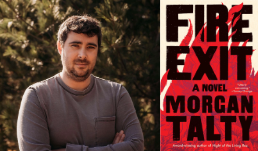- Categories:
A Q&A with Morgan Talty, Author of June Indie Next List Top Pick “Fire Exit”
- By Zoe Perzo
Independent booksellers across the country have chosen Morgan Talty’s Fire Exit (Tin House Books) as their top pick for the June 2024 Indie Next List.

For years, Charles Lamosway has watched from his porch as Elizabeth grows up on the reservation across the river. Fire Exit follows Charles as he struggles with his past, with the secret that Elizabeth is his daughter, and his desire to tell her the truth.
“A gorgeous and all-consuming novel, Fire Exit lays bare the consequences of one man’s decisions, and his resolve to reconcile his past by taking care of his aging mother and seeking a connection with his unknown daughter. Unforgettable,” said Olivia Marchese of Author's Note in Medina, New York.
Here, Talty discusses his work with Bookselling This Week.
Bookselling This Week: This novel deals with the complexities of blood quantum rules and how they can affect a person’s sense of self. Do you want to talk a little bit about that?
Morgan Talty: Blood quantum is a colonial tool that many federally recognized tribes use to keep track of citizenship. I've watched one friend beat up another because they were arguing about who was more Native and why and it all related to the amount of “Indian Blood” we possessed. Tribes that have adopted blood quantum as a means to keep track of citizenship are slowly allowing this perfect tool to do its job, which is to destroy us. How can a person or a person's sense of self — or a tribe — flourish when we are fighting about something like this?
BTW: By day you’re an English professor! How did that expertise/experience affect your writing process?
MT: Teaching has always been a way for me to return to the basics. I teach creative writing at all levels and literature as well, and I never start a class thinking I know it all, even if it is, say, an introduction to creative writing. For me, teaching is also learning, and in ways I find hard to articulate this is reflected in my writing — I suppose because through teaching, I’m also practicing what I teach at the same time.
BTW: We see Charles go from being an almost passive participant in his own life, watching his daughter grow up from afar, to taking a more active role. Do you want to talk more about creating Charles’ story arc?
MT: A lot of Charles’ creation was propelled by the early drafts of this book. I always knew that the premise would be this: a non-native man and a native woman with only the bare minimum of blood quantum would have a child, and that woman would lie and say the child was someone else’s so the child could be considered “Penobscot.” Throughout the drafts I wrote, I began to think about time: where do I start Charles’ story so he can begin to live by chasing his desires? The space and time I chose, for me, I think, was the right place for the story to be set into motion. Creating Charles’ story arc was difficult because of the complexities, consequences, and contradictions of blood quantum, but nonetheless I’d do it again.
BTW: Any idea what’s next for you?
MT: Oh, you know, maybe another book? I’ve written a story collection and now a novel, so there might be some nonfiction on the horizon? But more on that after the sunset comes for Fire Exit.
BTW: Could you tell us about the role of books and indie bookstores in your life?
MT: Books have made me feel more, and they’ve granted me access to spaces and ideas I never would have encountered. In many ways, the sum of literature is the sacred for me, and without it I don’t know where I would be. To imagine a world without books…impossible. And the same for indie bookstores, which are the very places that carry the sacredness of story. But who opens that door? The indie booksellers, the ones who give so much of their lives to making books available to people. I suppose what I’m saying is those indie booksellers (and anyone who is spending their life doing this kind of work) are the reason I am here. They’re the storykeepers — the ones we, or at least I, need to keep going.

